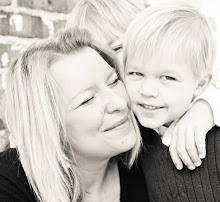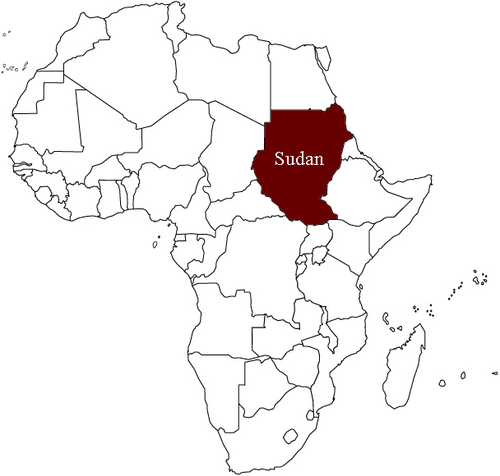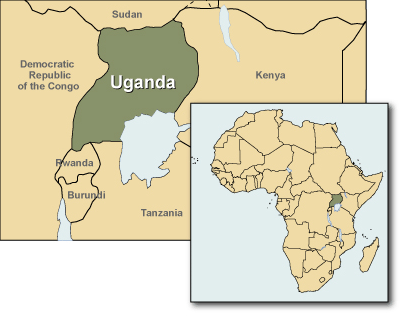Our final day in Sudan was spent with the Taposa Tribe. This people group is the largest in this district of Sudan, with over 905,000 members. Three years ago, it was the Taposa Tribe who told us that they now had nearly everything they needed; clothing, schools, water, and safety. The only thing they still lacked was a medical center. Pastor Rob Douglass of Saving Grace World Missions and Ends of the Earth Ministries, was able to gather enough support for the medical center to be built for the Taposa; but to date, the center has not been occupied.
We were then led to a small corral area where we were shown the skin of a goat that was still drying. The goat had been recently sacrificed in hopes that the blood and dung from the goatthat was smeared on a sick Taposa child would make that child well. As we walked through the dusty and dry village, we came to a hut where the 8 year old sick child was. He was sitting in the doorway of the hut. His body was swollen from an unknown disease. He sat very still as he stared at us with a vacant look in his eyes. As we knelt down to pray with him, he slightly pulled away from us; unsure of what we were trying to do. Because of the fact that the medical center has not been funded for operation, this child, like many if the other children of the Taposa tribes, will simply be left to die.
You can imagine how this scene broke our hearts as we could do nothing more than walk away and leave this child in the hands of God. Our hearts have been stirred in many ways while we have been here in Sudan. With the Taus in the middle of a relocation project that will bring them near the medical clinic, this clinic will not only provide for the Taus, but for the Taposa Tribe as well. The vision that God has given us and that we are praying for, is to get this medical facility up and running. How amazing would it be to see this facility staffed by nurses who would be able to administer medications that will save the lives of these children. At the same time; and more importantly, it would allow us to show them that they are loved, that they are not forgotten, and would open the door for the Gospel to be preached.
It is our hope and prayer that the eyes of the tribes in South Sudan will be turned from darkness to light.
We have now .arrived safely back in Uganda and have had a chance to talk to our Gulu team. (remember that some of the missionaries went home last week, we went to Sudan, and another group went to Gulu) Gulu is the area in Northern Uganda where children have been abducted by Joseph Kony, the leader of the Lord's Resistance Army, (LRA). At night, thousands of children became night commuters in order to avoid abduction. While this is not currently happening, the effects of the terror still linger. The team met a teacher named Andrew that was abducted by the LRA when he was 14 years old. One night, Andrew chose not to commute with the other children, and stayed back with his family. He was held captive with 50 other children for over a month until he escaped by submerging himself under water and swimming upriver. By God's grace, Andrew is now born again and teaching at a Christian school where the LRA used to have their stronghold. He is now giving children in this war-torn area hope in Christ.
After a six hour bus ride on dirt roads, the team attended a Sunday service at Calvary Chapel Gulu. 150 people gathered in a school facility where some of the team members shared their testimonies. It was a wonderful time of fellowship with their brothers and sisters in Gulu.
Over the past week, the team has been hosting a VBS for over 500 children. These children had come from multiple churches within the Gulu District. Our team sang songs, did activities, and shared the Gospel with the children.
On a lighter note, one day the team was walking by a large bull. As the team passed by, the bull remained calm until Debbie, the team leader, walked by. The bull was startled and tried to chase her. Fortunately, he was tethered and was unable to get to Debbie. Needless to say, she was quite shaken, but the team and Debbie enjoyed a good laugh together afterwards.
Like most areas in Africa, Gulu is also experiencing a drought. The team had been fervently praying for rain and the Lord answered their prayers in a mighty way. One day, out of nowhere, the skies opened up and it began to pour. During the downpour, the team bus got stuck in the African mud. The entire team had to get out and push the bus. By the time they arrived at the school they were ministering in, they were caked with mud but rejoicing over the rain. And it hasn't stopped raining since! Our God is so faithful!
Tomorrow, the Gulu team will be heading back to the capital city of Uganda after a 6 hour drive for a time of debriefing, rest, and shopping. This will be our final update as we will all begin our journey home on Thursday and will arrive in LA on Friday.
It has been an honor and privilege sharing all that God is doing on the continent of Africa with you. On behalf of the Uganda/Sudan/Gulu mission teams, I would like to thank you for all of your support, love, and prayers.
Pastor Brent Kaser
Wednesday, August 5, 2009
New photos from Sudan
Sunday, August 2, 2009
Update 10 from Sudan
I hope this finds you well. Over the past couple of days, we have been visiting the Taus Tribe in Sudan. This is the tribe that Pastor Rob Douglass from Ends of the Earth Ministries, and James Nyika from FRUITS Ministries have been reaching out to for the past two years. When we saw the pictures and heard the stories of the Taus people, Promise Child began to sponsor the children of the tribe; bringing the children school uniforms, hot meals, and an education for the first time in their lives. What we can tell you now, is that there is no way that photos or words can paint a true picture of what is happening here.
We have started each day by cramming six people into a modified old Land Cruiser to drive two hours on roads that have never been maintained since their inception in 2002. As we drove, we were able to get the full history of this area of South Sudan from our driver. Four years ago, this region was literally a war zone. The Arabs of Northern Sudan were fighting the Sudanese People's Liberation Army (SPLA) of the South. Due to the war, many tribes were cut off from access to food and water, causing major relief organizations to carve this road through the deserts of Sudan in order to provide relief. This is the road that we were traveling on. The landscape starts off with a view of nothing more than huge thorn bushes with three inch spikes. It eventually becomes more of the beautiful African landscape that we traditionally see in photographs with the tall umbrella-like Acacia trees being the focal point of this beautiful scene. The wildlife has been amazing; baboons swinging from trees, birds of every size, shape, and color; deek deeks (miniature deer), cows, goats, donkeys, and termite mounds that look like giant chimney stacks. As we went to raise up our cameras to capture the scene, we were quickly told that we were driving through one of the largest military bases of the SPLA and that no photos could be taken. This is the very place where the former leader of the SPLA Army, (John Garang), was shot down and killed. For the members of the SPLA, this war is not really over and they are always on high alert. We came to a military checkpoint where they demanded to see our Sudanese visas that we had mistakenly left at the compound. After driving 1 1/2 hours, the fear was that we would have to turn around. We were momentarily detained while the guards radioed their commanders. This is when we began to pray (silently of course, asking God for favor). We were finally told that we could continue on our journey, but we would have to be escorted by one of the SPLA members. So, what was a tight jeep ride before, became even tighter as the young soldier with his AK-47, piled into the Land Cruiser.
As I stated before, all the pictures and all the stories in the world, could not prepare us for what we were about to see. After driving on roads for two hours, seeing no more than six people walking on the roads, we arrived at the Taus village.
Our initial thought before even walking through the village was, how could people possibly live here? It was so hot and dry, our fears were confirmed when we walked to the village water hole. Some of you have seen the picture of the pit that had very little water. That same pit is now completely dry. The Taus have been forced to barter goods with the local Dinka Tribe, and the water that they barter for is salty and unclean. One of the reasons why we are here, is to talk to the District Commissioner in hopes of moving the Taus Tribe to a more fertile and safe environment. As soon as this is accomplished, we will be able to put up a formal church/school building and raise funds to drill a water well. This will save lives of not only the Taus, but the entire community.
We were able to see the food storage area, which has also been a place that our supported missionaries hold Sunday school classes. There is a full time watchman protecting the food from not only the wild life, but local raiders as well. South Sudan has gone six months without rain. Because of this, crops have failed and there is a massive food shortage. Seeing the bags of maize (corn), beans, and oil that have been provided for through your love and support, brought great joy to our hearts. In the midst of the tragic conditions here, we at least know that the children are being fed, educated, and loved. It was incredible for us to watch the children do addition and subtraction on their dirt chalkboard with one of our missionaries, Danielle, who is a teacher. They all gathered in a group as Danielle took a big stick and wrote out the math problems on the ground. They shouted out the correct answers for one problem after another. Your support is definitely making a difference here.
It is like we have gone back into the stone- age here with the Taus. If I might paint a closing picture for you: there was a woman here who was preparing a meal. Her baby was strapped to her shirtless back, she was wearing beautiful tribal necklaces and a beaded belt; her face was marked with traditional tribal scars (circular dots on her forehead). She was bent over, stirring a small pot of mush being cooked over an outdoor pit of a few small twigs and branches. Next to her, was an old wrinkled woman under a shade tree who had multiple ear holes and a lip piercing. With a rock in her right hand, and maize in her left hand that she was casting onto a larger stone, she was grinding away in preparation for the next meal. As the women worked, one of the tribal chiefs passed by with spear in hand. He wore a fancy beaded headdress, a multi-colored necklace, and a colorful wrap around skirt.
Seeing what we have seen, has given up just a taste of what Paul meant when he said; "More than that, I count all things to be loss in view of the surpassing value of knowing Christ Jesus for whom I have suffered the loss of all things, and counted them as rubbish so that I may gain Christ."
For us; counting the cost has meant dealing with cockroaches the size of cats, the buzzing of mosquitoes, long bumpy jeep rides, cold showers, hanging out with chickens that you know will become dinner, drinking water that is the temperature of hot tea...all the time, and sleeping in a pool of sweat because of the sweltering heat. This may sound terrible, but in the end, we know we will get into a jeep and drive away, board a plane, and fly home, enter into a nice home with air conditioning and incredibly comfortable beds. For the people in South Sudan, this nightmare never ends; they are stuck in this cavern of hopelessness. Counting the cost for them means suffering from disease due to lack of sanitation, walking miles in the scorching heat to work for pocket change, and watching their children die from starvation, disease, and despair.
So what can we do? We can go. We can send. And we can pray; trusting that the Lord has a love for the people of South Sudan that is so much deeper than ours...a love that can bring hope.
"For the needy will not always be forgotten, nor the hope of the afflicted perish forever. Arise, O'Lord do not let the enemy prevail."
Subscribe to:
Posts (Atom)












